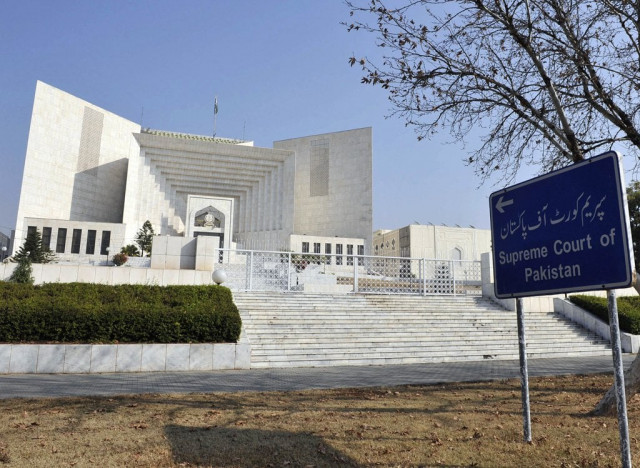SC seeks modus operandi for probe against Isa
Observes SJC judgment can also be set aside if it is based on mala fide

PHOTO: FILE
The reference filed in May 2019 with the Supreme Judicial Council (SJC) – the only constitutional forum that can hold a superior court judge accountable – accused that Justice Isa did not disclose his family members’ foreign assents in his wealth statement and sought his removal.
Justice Isa later challenged the reference and the SJC’s proceedings in the apex court.
Resuming hearing of Justice Isa’s petition against the reference, the Supreme Court full-court led by Justice Umar Ata Bandial asked Naseem to explain if the material against the SC judge was collected illegally and whether it could be relied upon to file a reference.
The bench also questioned as to how the complaint against the judge was filed to the Assets Recovery Unit (ARU) – a specialized body formed by the PTI government to bring back ill-gotten wealth stashed abroad – and not to the SJC which could also initiate suo motu proceedings against the judge.
Earlier, Dr Naseem, who handed in his resignation from the federal cabinet a day earlier to represent the federal government in the case – contended that the SC judge did not provide a money trail about properties owned by his family members abroad.
He said the judge has admitted that his family owns properties in the United Kingdom, but he did not provide a money trail to establish how the money was sent abroad to purchase the flats. “A judge should be blameless, in view of the judges’ code of conduct,” Naseem said.
However, Justice Syed Mansoor Ali Shah asked the counsel to prove that the properties were “benami” and that the fund was provided by Justice Isa. A property can be described as “benami” if it is transferred to, or is held by, a person but it has been paid for by another person.
“You have to establish that children and spouse are dependent on the SC judge. If my son purchases a property outside the country as an independent, will I then be answerable everywhere?” he asked.
Naseem replied that the burden to prove that the properties are benami and that the funds to purchase them came from Justice Isa is not on the federal government, adding that tax record shows that the SC judge’s spouse had no income to purchase flats in London.
Justice Bandial observed that the petitioner judge explained that his spouse is a taxpayer, and that she should be asked about the source of funds used to purchase properties.
Justice Muneeb Akhtar wondered whether the federal government was deviating from the reference wherein it is only alleged that the SC judge violated the income tax law by not disclosing family members’ properties in his wealth statement.
“There was no mention about the money trail in the reference,” he added.
Raising questions over the jurisdiction of the apex court to hear the petition, Dr Naseem argued that when the SJC issued show cause notice to Justice Isa then the SC was barred from examining the matter in view of Article 211 of the Constitution.
“The SC had intervened in the matter of former chief justice of Pakistan Iftikhar Chaudhry [who also faced a presidential reference] because the SJC had not issued show cause notice to him. However, in the present case, a show cause notice has already been issued to Justice Isa,” he said.
Justice Muneeb Akhtar, referring to the Brexit case, observed that if the foundation of a reference is illegal then the SC may declare the reference as a blank paper, according to the British Supreme Court.
The UK court had reviewed the question whether the PM had wrongly advised the Queen to adjourn the session of parliament. The UK government has taken the stance that acts of parliament cannot be questioned in the court.
The UK top court had rejected that argument saying that if the initial advice of PM was unlawful then it meant that all the subsequent proceedings based on that advice were illegal.
In the law, it would be the same as if a blank piece of paper had been submitted to Queen and the parliament and, obviously, adjournment of parliament could not have been effected on a blank piece of paper, the court had noted.
Justice Muneeb said if the reference itself is mala fide and unlawful, then it amounted to a blank piece of paper and the SJC could not have issued a show cause notice on a blank piece of paper.
Justice Faisal Arab asked whether it was mandatory for the SJC to issue a show cause notice to a judge on a presidential reference. “If something is based on mala fide intentions then the SC can interpret in the matter at any stage. Even after completion of the SJC inquiry against the judge,” he said.
The bench was surprised when Dr Naseem submitted fresh documents regarding collection of evidence against Justice Isa. It asked as to why the government did not place such documents before, when Isa’s counsel was questioning the manner in which material was collected against the SC judge.
Earlier, Justice Isa’s counsel referred to a fresh application of Justice Isa in which he objected to Dr Naseem representing the federal government and described him as a “tout”. However, the bench decided to pass an appropriate order on the SC judge’s application later.
The hearing of the case has been adjourned till tomorrow.



















COMMENTS
Comments are moderated and generally will be posted if they are on-topic and not abusive.
For more information, please see our Comments FAQ